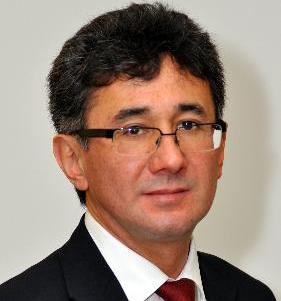
Research Interest
Immunology; Inflammation; Cardiovascular Diseases; Stem Cells; Drug Delivery Systems; Tissue Engineering; Regenerative Medicine.
In 1994, Dr. Arman Saparov was invited to the School of Medicine at the University of Alabama at Birmingham, USA, to complete his Post-Doctoral training under the mentorship of Professor Casey Weaver. In 1998, he was promoted to a permanent faculty position at the same institution.
From 2001 to 2007, Dr. Saparov held various leadership positions at Xenogen Biosciences, located in the greater Princeton area, New Jersey. During his employment at Xenogen, he led research projects in the areas of immunology, inflammation, cell technology and genetic engineering. The main focus of his research was to determine the molecular mechanisms of disease pathogenesis and to define the effect of genes on the initiation and development of various diseases including cardiovascular diseases, lung inflammation, rheumatoid arthritis, diabetes, encephalitis and others. Dr. Saparov also managed research that tested new drugs for the treatment of these diseases. In his projects, he collaborated with some of the largest pharmaceutical companies of the world, including Pfizer, Merck, Bristol-Myers Squibb and Schering Plough.
In 2007, Dr. Saparov joined Partners HealthCare System, a not-for-profit integrated health system founded by Massachusetts General Hospital and Brigham and Women’s Hospital. They are a global leader in quality patient care, medical education and biomedical research and a teaching affiliate of Harvard Medical School.
After joining Nazarbayev University in 2010, Dr. Saparov served as a Director of a newly created Directorate of the Integrated Academic Health System, an Acting Dean of NU Foundation, a Pre-Medicine Program Director, an Acting Chair of the Biology Department, a Chief Executive Director, a Vice Dean of Admissions and a Director of the Bachelor of Medical Sciences Program at the School of Medicine.
Research interests:
The pathological progression following myocardial infarction is very complex and involves a number of cell populations including cells localized within the heart, as well as cells recruited from circulation and other tissues that participate in inflammatory and reparative processes. These cells, with their secretory factors, have pleiotropic effects that depend on the stage of inflammation and regeneration. Excessive inflammation leads to enlargement of the infarction site, pathological remodeling and eventually, heart dysfunction. Stem cell therapy is considered a promising approach in treating coronary heart disease including myocardial infarction. However, harsh conditions at the site of injury, including hypoxia, oxidative and inflammatory stress, increased fibrosis and insufficient angiogenesis, and in some cases, immunological response or incompatibility, are detrimental to stem cell survival. To overcome the complexity and deficiencies of stem cell therapy, drug delivery systems are being investigated because they offer a controlled and sustained release of bound growth factors and cytokines. Moreover, targeted delivery of stem cells preconditioned with hypoxia and/or oxidative/inflammatory stimuli or pre-differentiated cells in combination with controlled release of immunomodulatory and wound healing factors will treat myocardial infarction more effectively than the transfer of factors alone, by reducing the infarct size and inflammation, and generating more functional cardiac tissue.
Recent Publications (since 2019):
- Kim Y, Zharkinbekov Z, Sarsenova M, Yeltay G and A Saparov. Recent Advances in Gene Therapy for Cardiac Tissue Regeneration. International Journal of Molecular Sciences, 2021, 22(17), 9206;
- Jimi S, Saparov A, S Takagi. Editorial: Cellular and Molecular Mechanisms at the Proliferation Stage in Wound Healing: From Scarring to Tissue Regeneration. Front Cell Dev Biol. 2021 Feb 19; 9: 659089;
- Raziyeva K, Kim Y, Zharkinbekov Z, Kassymbek K, Jimi S and A Saparov. Immunology of Acute and Chronic Wound Healing. Biomolecules, 2021 May 8; 11(5): 700;
- Ogay V, Sekenova A, Li E, Issabekova A and A Saparov. The Therapeutic Potential of Mesenchymal Stem Cells in the Treatment of Atherosclerosis. Current Stem Cell Research & Therapy. 2021; 16(7):897-913;
- Kim Y, Nurakhayev S, Nurkesh A, Zharkinbekov Z and A Saparov. Macrophage Polarization in Cardiac Tissue Repair Following Myocardial Infarction. International Journal of Molecular Sciences, 2021 Mar 8; 22(5): 2715;
- Jimi S, Koizumi S, Sato K, Miyazaki M and A Saparov. Collagen-Derived Dipeptide Pro-Hyp Administration Accelerates Muscle Regenerative Healing Accompanied by Less Scarring After Wounding on the Abdominal Wall in Mice. Scientific Reports, 2021, 11(1): 18750;
- Nurkesh A, Jaguparov A, Jimi S and A Saparov. Recent Advances in the Controlled Release of Growth Factors and Cytokines for Improving Cutaneous Wound Healing. Front Cell Dev Biol. 2020 Jul 14;8: 638;
- Ogay V, Mun EA, Kudaibergen G, Baidarbekov M, Kassymbek K, Zharkinbekov Z and A Saparov. Progress and Prospects of Polymer-based Drug Delivery Systems for Bone Tissue Regeneration. Polymers (Basel). 2020 Dec 1; 12 (12): 2881.
- Raziyeva K, Smagulova A, Kim Y, Smagul S, Nurkesh A and A Saparov. Preconditioned and Genetically Modified Stem Cells for Myocardial Infarction Treatment. International Journal of Molecular Sciences, 2020, 21 (19): 7301;
- Jimi S, Jaguparov A, Nurkesh A, Sultankulov B and A Saparov. Sequential Delivery of Cryogel Released Growth Factors and Cytokines Accelerates Wound Healing and Improves Tissue Regeneration. Frontiers in Bioengineering and Biotechnology, 17 April 2020;;
- Takagi S, Oyama T, Jimi S, Saparov A and O Hiroyuki. A Novel Autologous Micrografts Technology in Combination with Negative Pressure Wound Therapy (NPWT) for Quick Granulation Tissue Formation in Chronic/Refractory Ulcer. Healthcare (Basel), 2020 Nov 25; 8 (4): 513;
- Ogay V, Kumasheva V, Li Y. etc. Improvement of Neurological Function in Rats with Ischemic Stroke by Adipose-derived Pericytes. Cell Transplantation, Jan-Dec 2020; 29: 963689720956956;
- Smagul S, Kim Y, Smagulova A, Raziyeva K, Nurkesh A and A Saparov. Biomaterials Loaded with Growth Factors/Cytokines and Stem Cells for Cardiac Tissue Regeneration. International Journal of Molecular Sciences, 2020, 21 (17), 5952;
- Jimi S, Takagi S, De Francesco F, Miyazaki M and A Saparov. Acceleration of Skin Wound-Healing Reactions by Autologous Micrograft Tissue Suspension. Medicina 2020, 56 (7), 321;
- Sultankulov B, Berillo D, Kauanova S, Mikhalovsky S, Mikhalovska L and A Saparov. Composite Cryogel with Polyelectrolyte Complexes for Growth Factor Delivery. Pharmaceutics, 2019 Dec 4; 11(12);
- Sultankulov B, Berillo D, Sultankulova K, Tokay T and A Saparov. Progress in the Development of Chitosan-based Biomaterials for Tissue Engineering and Regenerative Medicine. Biomolecules, 2019 Sep 10; 9(9)



